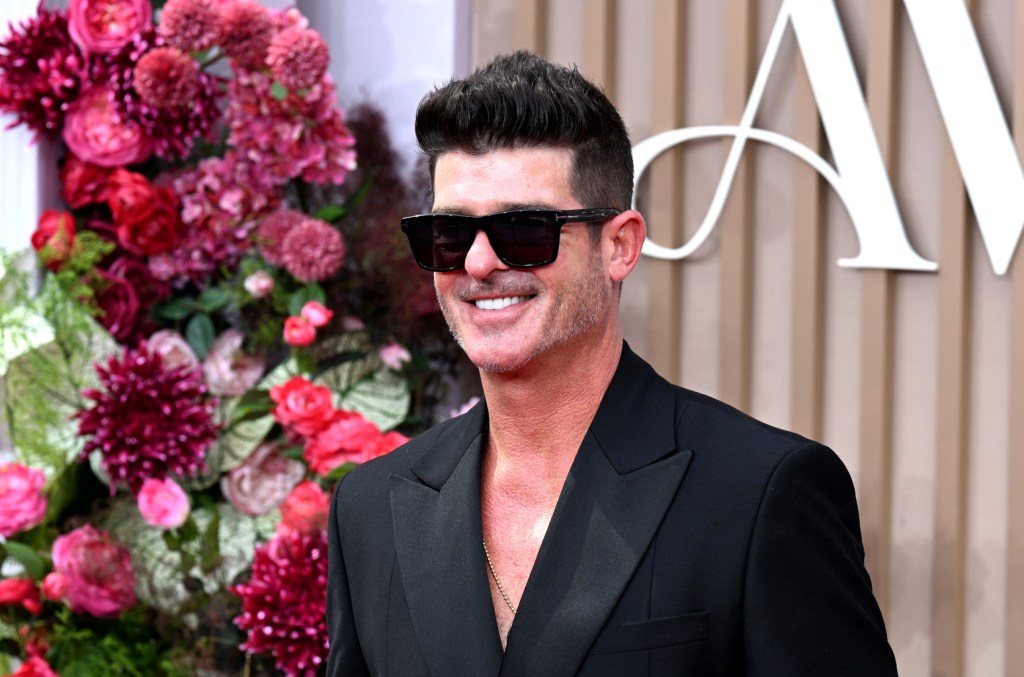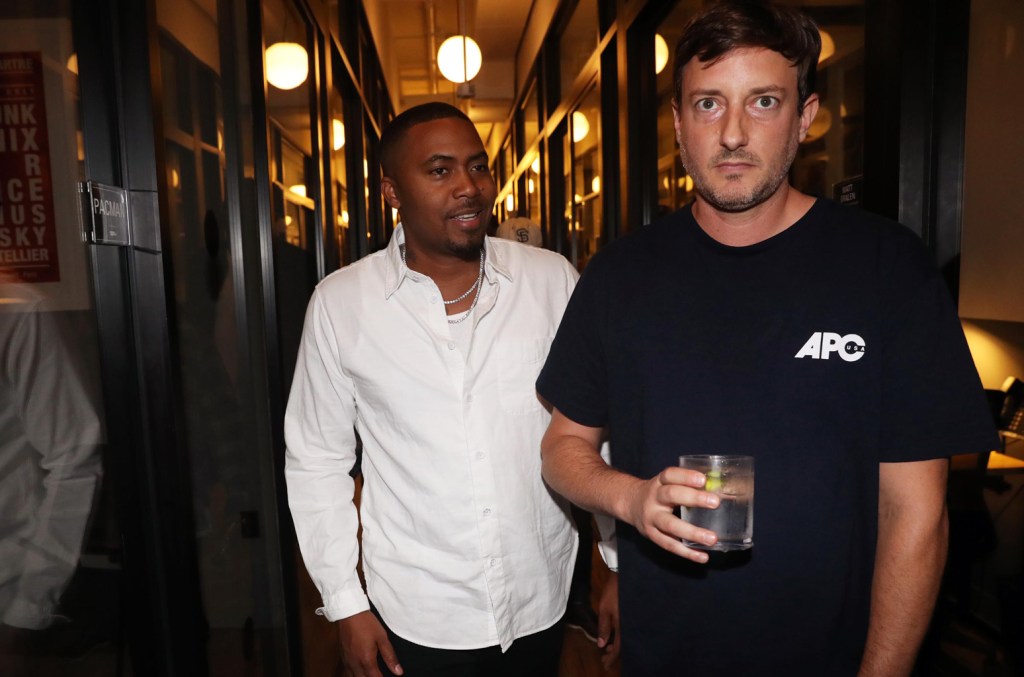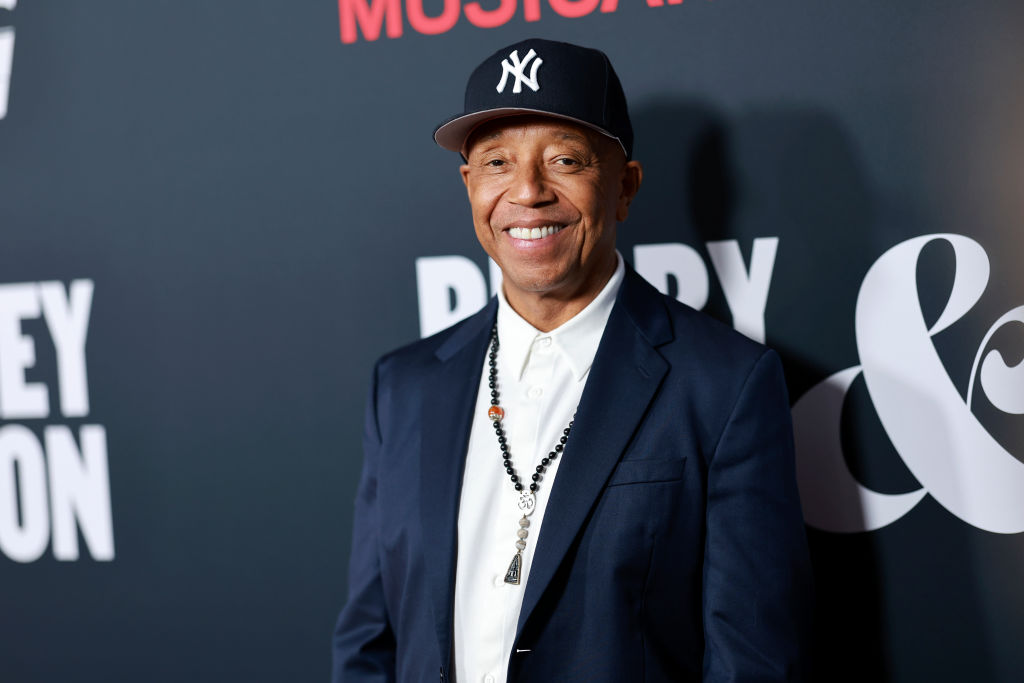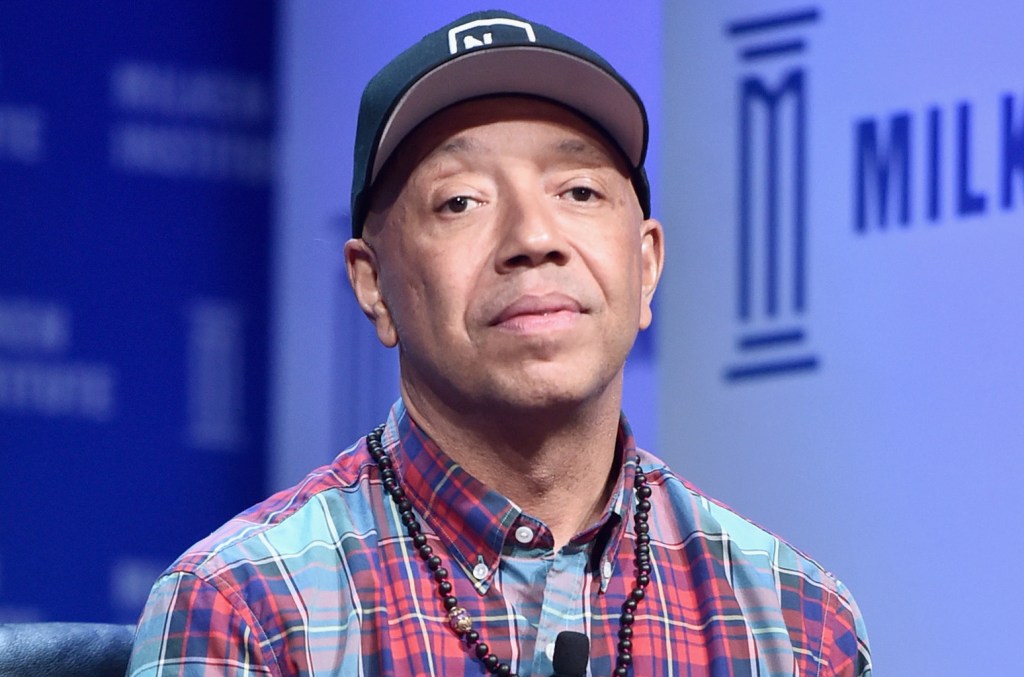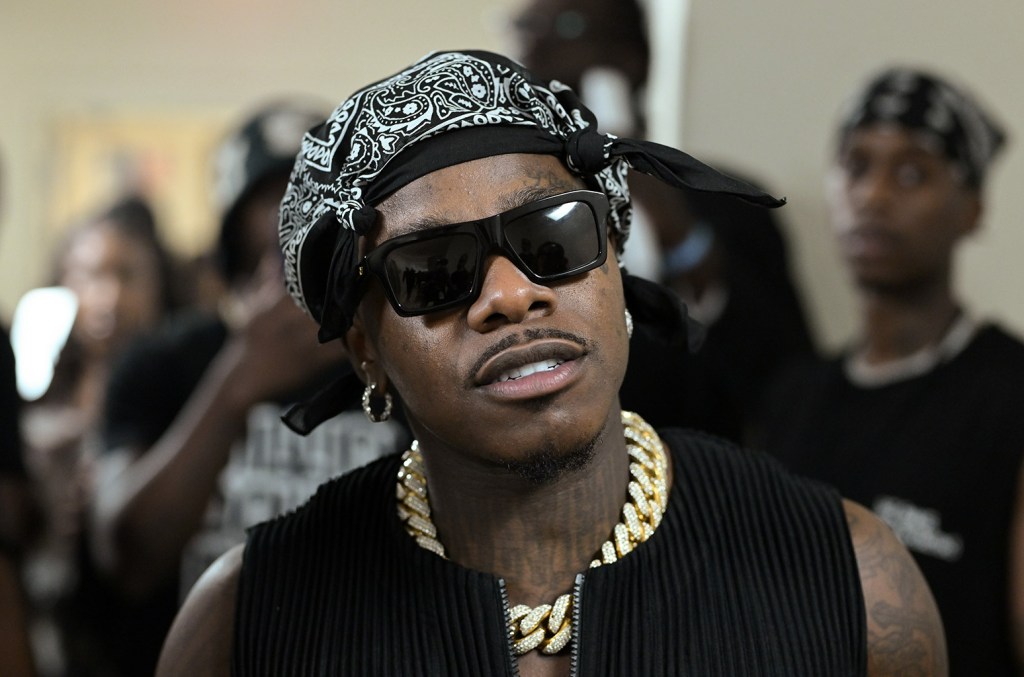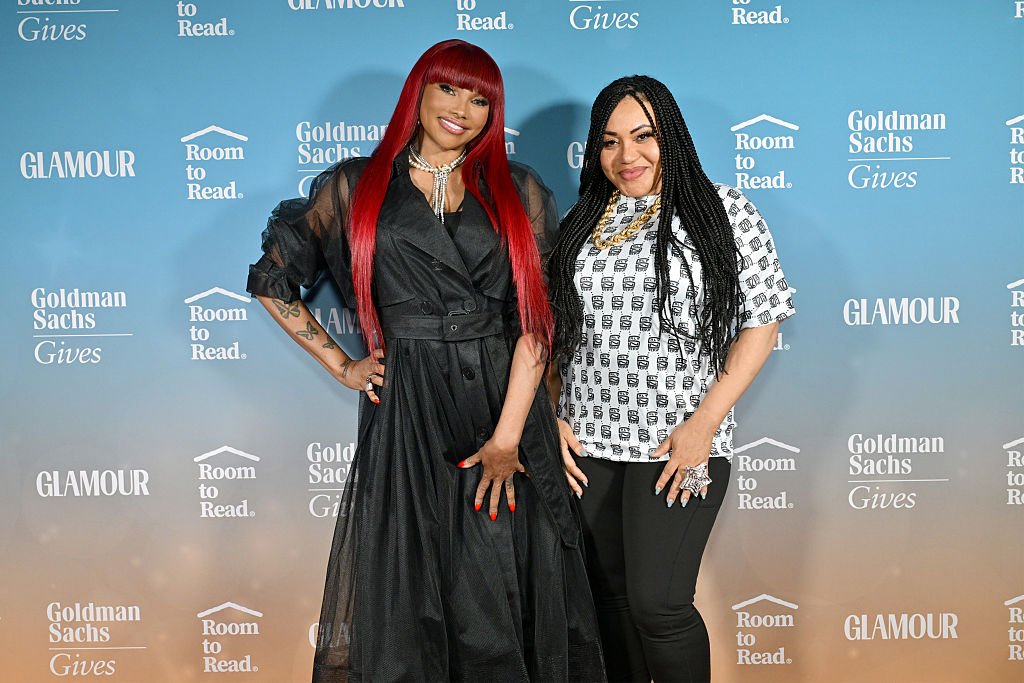Lawsuit
Page: 7
Robin Thicke is the latest music industry figure to face a copyright infringement lawsuit for supposedly posting paparazzi pictures of himself on Instagram without paying to license the images.
Thicke is the target of a federal lawsuit filed on Monday (June 16) by celebrity photo agency BackGrid USA Inc., which claims to own the rights to two paparazzi shots that the singer and music producer posted to Instagram in 2022.
One of the images in question shows Thicke riding shotgun in a convertible, and the other depicts him leaving the restaurant Catch Steak with his now-wife, April Love Geary. These photos are no longer available on Thicke’s Instagram page, but the lawsuit attaches screenshots of these seemingly deleted social media posts.
Trending on Billboard
“Defendants violated federal law by willfully infringing BackGrid’s copyrights to at least two photographs,” write BackGrid’s lawyers. “By uploading the Thicke photographs to the Instagram account, defendants encourage their fans to ‘share’ the photograph, thus causing others to also willfully infringe and multiplying the harm to BackGrid.”
BackGrid claims Thicke should have known better than to post these photos without proper licenses, since he’s a “sophisticated creator of copyrighted works” who himself owns more than 100 copyright registrations. The photo agency also points out that Thicke is no stranger to intellectual property law, having faced lengthy copyright litigation over his 2013 hit “Blurred Lines.”
The new lawsuit seeks a court injunction blocking Thicke from infringing BackGrid’s copyrights again, as well as monetary damages for the alleged wrongdoing. The agency notes that it “made exhaustive efforts to resolve this lawsuit with defendants prior to filing this action.”
A rep for Thicke did not immediately return a request for comment on the claims.
The lawsuit comes a month after BackGrid brought a similar case against Jennifer Lopez for allegedly posting two paparazzi pictures of herself outside a Golden Globes pre-party this past January without licenses.
Lopez and Thicke are far from the first celebrities to encounter this type of legal action over pictures of themselves on their own social media accounts. Artists including Miley Cyrus, Dua Lipa and Justin Bieber have all faced similar lawsuits in the last few years.
As Billboard wrote in 2022, U.S. copyright law is on the side of photographers and image licensers. Though it may seem unfair, celebrities do not automatically co-own images of themselves and therefore don’t have the right to repost them for free.
Nas’ record label and media company, Mass Appeal, has inked a settlement with a white former executive who claims she was the target of discrimination and forced out because of her race.
Mass Appeal filed a joint motion with its former head of development, Melissa Cooper, in federal court on Friday (June 13), agreeing to dismiss the case entirely. Court filings show that Mass Appeal and Cooper have reached a settlement, although the terms of the deal were not disclosed.
Cooper sued Mass Appeal, CEO Peter Bittenbender and the company’s former content chief, Jenya Meggs, in 2023, claiming she was the subject of a “racist conspiracy” at the company. Nas is not individually named as a defendant in the lawsuit.
Trending on Billboard
Cooper said Meggs, who is Black, regularly disparaged her in meetings due to her alleged animosity toward a “white woman working in hip-hop.” Meggs eventually refused to work with Cooper, the lawsuit alleged, leading Bittenbender to take Cooper off big projects like the planning of Mass Appeal’s Hip Hop 50 Live concert. Cooper was ultimately terminated from Mass Appeal in June 2023.
After the firing, a former romantic partner of Meggs contacted Cooper and shared a slew of text messages between Meggs and a documentary producer that disparagingly referred to Cooper as a “cracker” and criticized “white folk.”
Cooper claimed she brought these messages to Bittenbender, but that he shrugged them off and took no action. Her lawsuit sought reinstatement to Mass Appeal, plus monetary damages for the supposed racism she endured.
Mass Appeal, Bittenbender and Meggs all “vigorously” denied engaging in any discrimination. They said in court filings that Cooper was terminated for financial reasons because her division had not sold any projects in a year, and that Meggs’ text messages were “taken out of context and are nothing but a red herring.”
Cooper and Mass Appeal exchanged evidence throughout 2024 and finished deposing witnesses this past December. They were about to begin the process of filing motions for summary judgment, followed by a possible trial, when a settlement was reached through mediation.
Lawyers for Cooper and reps for Mass Appeal did not immediately return requests for comment on the settlement on Monday (June 16).
Meggs departed Mass Appeal in 2024, according to her LinkedIn profile.
Mass Appeal began as a print magazine in 1996 and was revived by Nas in 2014, when the hip-hop legend partnered with Bittenbender to relaunch the magazine and open the label Mass Appeal Records and content division Mass Appeal Media.
The company signed a global distribution deal with Universal Music Group in 2018.
AI music startup Udio is facing another copyright lawsuit — this time a proposed class action on behalf of independent artists who have been “left without a seat at the table” in the high-profile litigation filed by the major labels.
Weeks after news that Universal Music, Warner Music and Sony Music were in talks to potentially settle their billion-dollar lawsuit against Udio, a country singer named Tony Justice is filing his own case against the company in Manhattan federal court.
Seeking to represent “thousands” of other independent artists in a class action, Justice says the earlier lawsuit filed by the Big Three won’t adequately protect the interests of musicians who aren’t signed to a major label deal.
Trending on Billboard
“Independent artists, whose rights have been trampled the most, are the ones left without a seat at the table, unrepresented, and without a meaningful remedy,” attorneys for Justice write in the lawsuit, filed Monday (June 16). “Class members will never be able to claw back the intellectual property unlawfully copied by Udio and used to train its AI.”
A spokesperson for Udio did not immediately return a request for comment on Monday.
AI models like Udio are “trained” by ingesting millions of existing works, thus teaching them to spit out new ones. As AI tech has boomed in recent years, dozens of lawsuits have been filed in federal court over that training process, arguing that AI companies are violating copyrights on a massive scale.
AI firms argue back that such training is legal “fair use,” transforming all those old “inputs” into entirely new “outputs.” Whether that argument succeeds in court is a potentially trillion-dollar question — and one that has yet to be definitively answered by federal judges.
Universal, Warner and Sony sued both Udio and Suno, another AI music firm, last summer, claiming the tech startups had built their models by stealing music on an “unimaginable scale” and “trampling the rights of copyright owners.”
Those cases remain pending, but news broke earlier this month that all three music companies were in talks to potentially settle the litigation by striking licensing deals with the companies. In return for allowing Suno and Udio to train on the vast collections of songs, the proposed deals would see the majors collect fees and receive equity in the startups.
In Monday’s new case against Udio, Justice largely echoes the allegations made by the majors. He says the company has infringed copyrights by training its machines on his songs, including his “Last of the Cowboys,” which has racked up more than 8 million streams on Spotify.
But his case was filed as a proposed class action, meaning he wants to also represent other independent artists who have suffered similar alleged treatment by Udio. He says “thousands” of other artists could eventually be part of the case.
“These acts by Udio were abuse and exploitation of another’s intellectual property of the worst kind,” his lawyers write. “Rather than license copyrighted songs like every other tech-based business is required to do, Udio elected to simply steal the songs of independent artists, plaintiffs, and the class members to then generate AI-soundalike music at virtually no cost to Udio.”
Música mexicana singer-songwriter Codiciado has filed a lawsuit against his old record label, Rancho Humilde, and former bandmates in the ensemble Grupo Codiciado, claiming they stole his intellectual property by getting the band back together under the name Los Codicia2 after he went solo.
Codiciado (Erick de Jesús Aragón Alcantar) made the accusations in a federal lawsuit filed Tuesday (June 10) against Rancho Humilde; the label’s trio of co-founders, Jaime Humilde, Jose “JB” Becerra and Roque “Rocky” Venegas; and former Grupo Codiciado members Alexis Aguirre, Ivan Ramirez and Giovanni Rodriguez Meza.
Grupo Codiciado formed in Tijuana in 2015 and later signed with Rancho Humilde; it reached No. 8 on the Regional Mexican Albums chart with Miro Lo Que Otros No Miran in 2018. The group disbanded in 2021, after which its lead singer, Codiciado, went solo, returning to the Billboard charts with his song “Vamos Aclarando Muchas Cosas” in 2023 and launching a successful tour the following year.
Trending on Billboard
The trouble started when Aguirre, Ramirez and Rodriguez Meza debuted a new group called Los Codicia2, pronounced “Los Codiciados,” under Rancho Humilde at the beginning of 2025. Codiciado claims the group’s name infringes his own trademarked moniker.
“The infringing mark adopted and used by defendants is practically identical to plaintiff’s marks,” wrote Codiciado’s lawyers. “This mark differs from plaintiff’s ‘CODICIADO’ mark only in that the final letter is ‘S’ and in the preceding term ‘LOS.’”
Codiciado says Rancho Humilde and his former bandmates are purposefully trying to mislead fans into thinking he’s affiliated with or endorses the new group, stating in the lawsuit that they’re attempting to “trade on the goodwill of plaintiff’s marks, cause confusion and deception in the marketplace and divert potential sales of plaintiff’s products to defendants.”
According to Codiciado, this alleged wrongdoing has persisted despite his sending multiple cease-and-desist letters to the label and band. He’s now seeking a court injunction to make them stop, plus monetary damages for trademark infringement, trademark dilution and unfair competition.
“Defendants’ acts are causing and, unless restrained, will continue to cause incalculable damage and immediate irreparable harm to plaintiff and to his valuable reputation and goodwill with the consuming public for which plaintiff has no adequate remedy at law,” the lawsuit reads.
Representatives for Codiciado declined to comment on the claims. Rancho Humilde did not immediately return requests for comment.
Russell Simmons has launched a lawsuit against HBO for $20 million over the release of the 2020 documentary, On The Record, which detailed a number of he mogul’s sexual assault allegations. Simmons also named the filmmakers behind the production of the documentary.
Russell Simmons, 67, filed the lawsuit in a Manhattan court on Tuesday (June 3), naming HBO and On The Record direcctors, Amy Ziering and Kirby Dick as reported by Deadline. In the summons that was filed in court, Simmons’ lawyer Imran Ansari laid out their offensive move.
“Despite voluminous support for Mr Simmons in the form of credible information, persuasive evidence, witness statements, and calls for further investigation by notable members of the media, politics, and the civil rights movement, the defendants simply disregarded it, and released, and continue to re-release globally, a film that tremendously disparaged and damaged Mr Simmons with salacious and defamatory accusations that he vehemently denies,” Ansari and co-counsel Carla DiMare shared in a statement.
Although the statute of limitations for defamation has long since expired, Simmons and his team are hoping to move things in their favor because the documentary was shown in the global market, thus resetting the timeline.
HBO sidestepped the lawsuit, calling it unfounded according to Deadline‘s report.
“We dispute Mr. Simmons’ allegations, stand by the filmmakers and their process, and will vigorously defend ourselves against these unfounded allegations,” a spokesperson for Warner Bros. Discovery shared with the outlet.
Russell Simmons’ team claims that evidence could potentially alter the timeline of events and give new weight to the Def Jam Records co-founder’s stance that the dozens of women who allege that he assaulted them are selling a falsehood.
—
Photo: Matt Winkelmeyer / Getty
HipHopWired Featured Video
Russell Simmons is suing HBO for defamation over a 2020 documentary focused on the sexual assault allegations against him, claiming the film disregarded evidence in his favor — including “CIA-grade polygraph results” and Oprah Winfrey’s withdrawal from the project.
In a complaint filed Tuesday (June 3) in Manhattan court, attorneys for Simmons say the movie On The Record defamed him by ignoring key information — including from over 20 witnesses — that would have “refuted and rebutted” the allegations that were “falsely made against plaintiff in the film.”
“The evidence and information were made available to defendants, including then CEO of WarnerMedia John Stankey, Chairman and CEO of HBO and Max Content, Casey Bloys,” the star’s lawyers write. “However, the Defendants disregarded and/or suppressed said materials.”
Spokespeople for HBO and parent company Warner Bros. Discovery did not immediately return a request for comment Wednesday (June 4).
Simmons, who founded Def Jam Recordings in 1984 and later built a formidable hip-hop empire, has faced a slew of abuse allegations since 2017 — first in an investigative article by the New York Times, then in the HBO doc. The film, directed by Kirby Dick and Amy Ziering, centered on claims made by Drew Dixon, a former A&R at Def Jam who says Simmons raped her, but also featured interviews with several other alleged victims.
In his complaint, Simmons says he provided HBO and the filmmakers with ample evidence that was “supportive and favorable” to him and would have countered those allegations. And he says the network was urged to consider that info by “luminaries in media and politics,” including “civil rights leaders and members of Congress.”
Simmons says the favorable evidence included “nine consecutive credible and favorable CIA-grade polygraph results” — presumably tests taken by him about the accusations. He also says HBO ignored the fact that Winfrey, the movie’s original executive producer, had withdrawn her support after “publicly noting inconsistencies in the accusations.”
“Defendants willfully, and/or recklessly, disregarded and suppressed said information and evidence, and published, and continue to republish defamatory content,” attorneys for Simmons wrote.
The lawsuit could face procedural challenges. The statute of limitations for libel lawsuits in New York is one year, a limit that has clearly lapsed for a movie released in 2020. Simmons’ lawyers will likely argue that he has continued to be defamed by new re-issues of the documentary, particularly in foreign markets.
The new case is a role reversal for Simmons, who has already been on the receiving end of a defamation lawsuit from Dixon over claims that he defamed her by suggesting during a podcast interview that she was lying about her allegations. He’s also facing a sexual assault lawsuit from another unnamed alleged victim.
NPR, the longstanding public broadcasting network, is standing up to President Donald Trump’s war on the media after filing a lawsuit this week. On Tuesday (May 27), NPR and three Colorado public radio stations filed a lawsuit stating that President Trump’s executive order to cut funding for the network and PBS is unconstitutional.
In a report from the network, NPR, Colorado Public Radio, Aspen Public Radio, and KSUT filed a suit in a District of Columbia court alleging that Trump’s sweeping executive order to end funding to the entities is a violation of their constitutional right to free speech.
“It is not always obvious when the government has acted with a retaliatory purpose in violation of the First Amendment. ‘But this wolf comes as a wolf,’” reads a portion of the lawsuit filing. “The Order targets NPR and PBS expressly because, in the President’s view, their news and other content is not ‘fair, accurate, or unbiased.’”
President Trump, White House budget director Russell Vought, Treasury Secretary Scott Bessent, and Maria Rosario Jackson, the chair of the National Endowment for the Arts, are all named as defendants.
“The Executive Order is a clear violation of the Constitution and the First Amendment’s protections for freedom of speech and association, and freedom of the press,” NPR President and CEO Katherine Maher added in a statement.
U.S. District Court Judge Randolph D. Moss is overseeing the matter. The same judge is also overseeing a similar case with the Corporation for Public Broadcasting (CPB) also suing President Trump.
—
Photo: Brooks Kraft / Getty
HipHopWired Featured Video
DaBaby has won a court order tossing out assault and battery claims over a 2022 brawl with the brother of his ex-girlfriend DaniLeigh, though the rapper could still be on the hook financially as the case continues against a bowling alley where the attack allegedly occurred. Los Angeles County judge Huey P. Cotton released an […]
Salt-N-Pepa, the legendary Hip-Hop group that amassed several hit songs in the 1980s through the 1990s, is currently fighting for the rights to their master recordings. Salt-N-Pepa filed a lawsuit against Universal Music Group (UMG), claiming that the label is violating copyright law by not giving the rights back to the group.
The Associated Press reports that Salt-N-Pepa, separately known as Cheryl “Salt” James and Sandra “Pepa” Denton, are angling to see the master recordings of their previously released material returned to them, especially as their music has viability in today’s market. Adding to this, many legacy acts are cashing via the ownership of their catalogs.
James and Denton asserted in their filing that they have rights to their music due to the Copyright Act of 1976, which allows artists to do away with previously signed deals and reclaim their master recordings.
This has been an ongoing fight for years after Salt-N-Pepa attempted to regain their master recordings but were rebuffed by UMG. The legal back and forth between the group and the label sparked UMG to remove its musical catalog from DSPs.
“UMG has indicated that it will hold Plaintiffs’ rights hostage even if it means tanking the value of Plaintiffs’ music catalogue and depriving their fans of access to their work,” a portion of the lawsuit read.
Salt-N-Pepa made their debut in 1986 with their album Hot, Cool & Vicious, produced by Hurby “Luv Bug” Azor. The group is also hoping to obtain the rights back to tracks like “Push It,” a song that has been used in movies and commercials several times since its release.
—
Photo: Getty
HipHopWired Featured Video
HipHopWired Featured Video
UMG (Universal Music Group) has filed a motion to have Drake’s amended lawsuit against his recording label dismissed, calling the rapper’s allegations “asthoning” in their filing. Drake filed a lawsuit against UMG at the top of the year over Kendrick Lamar’s hit diss record “Not Like Us” and has accused the label of defaming him.
As reported by Variety, UMG is responding to Drake’s claims made in the amended lawsuit, and the Canadian superstar is charging the label with heavily promoting the song, which features a lyric accusing him of being a pedophile.
The initial lawsuit came just as news surfaced that Kendrick Lamar would be the halftime performer at this year’s Super Bowl, and it was anticipated that “Not Like Us,” one of the biggest hit records of 2024, would be a centerpiece. It appeared that Drake wanted to get ahead of the noise regarding the track. Lamar did perform the track but altered the lyrics in question.
UMG, which filed its motion on Wednesday (May 7), had their legal representation address Drake’s amended lawsuit straight away, while seemingly taking a dig at the OVO honcho.
“As Drake concedes, Lamar’s Super Bowl performance did not include the lyric that Drake or his associates are ‘certified pedophiles’ (i.e., the alleged ‘Defamatory Material’ that is at the heart of this case). The focus of Drake’s new claims—that ‘the largest audience for a Super Bowl halftime show ever’ did not hear Lamar call Drake or his crew pedophiles—betrays this case for what it is: Drake’s attack on the commercial and creative success of the rap artist who defeated him, rather than the content of Lamar’s lyrics.”
Drake has not responded publicly to the entered motion as of yet.
—
Photo: Cole Burston / Getty

 State Champ Radio
State Champ Radio 